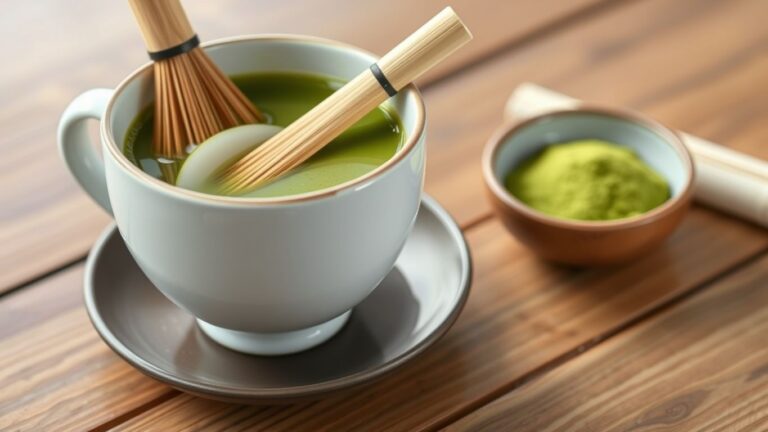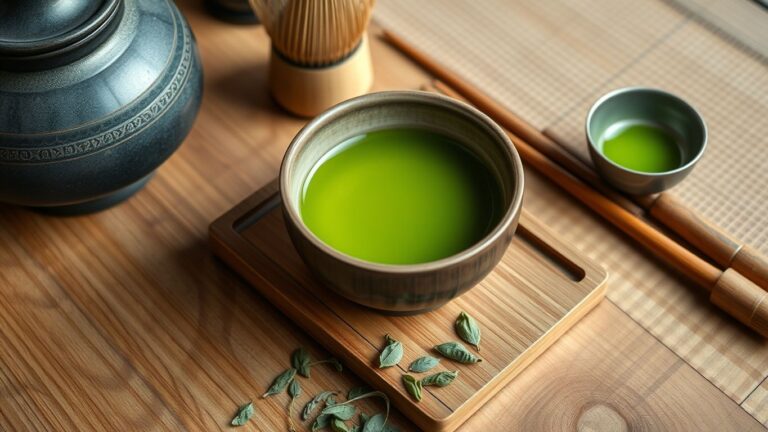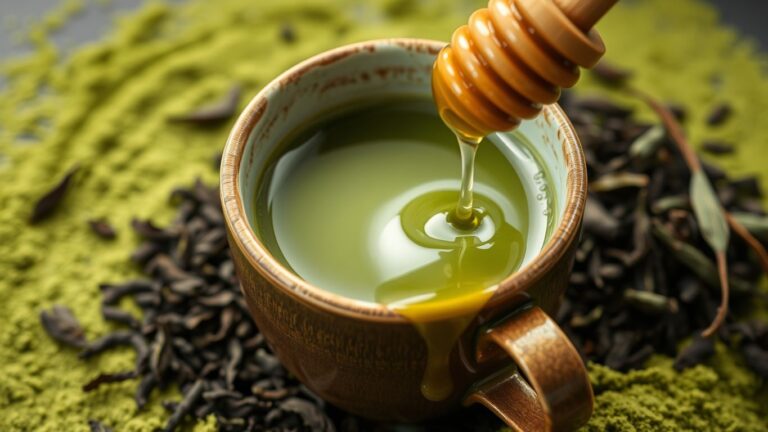Have you ever wondered if drinking matcha makes you poop? You’re not alone. Matcha green tea is famous for its bright green color and unique taste, but it also has some interesting effects on digestion. This article will explore how matcha’s caffeine and fiber content might help keep your digestive system regular. So, does matcha make you poop? Let’s find out how this special tea can affect your digestion.
Key Takeaways
- Matcha green tea can help improve digestion because it has caffeine, amino acids, and fiber, which promote regular bowel movements without the urgency that coffee can cause.
- The antioxidants in matcha, along with its polyphenols and hydration benefits, support overall gut health and help soothe the stomach.
- Drinking matcha in moderation might have a mild laxative effect due to its caffeine, which gently stimulates the colon, making it a natural option for maintaining regularity.
- Compared to coffee, matcha offers digestive benefits without the harsh laxative effect, making it a gentler choice for gut health.
- Consuming too much matcha can lead to digestive issues like diarrhea, so it’s important to enjoy it in moderation to avoid any negative effects.
The Digestive Side of Matcha

Matcha green tea can indeed have a stimulating effect on your digestion. To understand this better, let’s dive into what this magical powder contains.
How Matcha Stimulates Digestion
Matcha is packed with dietary fibers, including insoluble fiber. These fibers resist digestion and move through your gut, adding bulk to your stools. This can encourage bowel movements and help keep your digestive system running smoothly.
The Role of Insoluble Fiber in Matcha
The insoluble fibers in matcha aren’t digested, which helps move food quickly through your intestines. This movement helps expel toxins and waste from your body, promoting a healthy digestive system.
Antioxidants and Gut Health
Matcha is also rich in antioxidants, especially catechins, which help reduce inflammation in your gut. This can support overall gut health and make digestion easier. By drinking matcha, you’re giving your digestive system a gentle nudge to stay on track.
What Ingredients in Matcha Affect Bowel Movements?
Caffeine’s Impact on Digestion
Caffeine is a well-known stimulant that affects more than just your energy levels—it can also get your bowels moving. Matcha contains caffeine, albeit less than coffee, which can help stimulate bowel movements by increasing the contractions in your digestive system. This mild stimulation is enough to promote regularity without the harsh effects that coffee can sometimes have.
The Role of Catechins
Matcha is rich in antioxidants, particularly catechins, which have been shown to support overall gut health. These powerful polyphenols help reduce inflammation and promote a healthy gut lining, making your digestive system more efficient. Unlike coffee, which can sometimes irritate the stomach, matcha’s antioxidants work to soothe and protect your digestive tract.
Fiber Content and Its Effects
One of the lesser-known benefits of matcha is its fiber content. While matcha isn’t a major source of fiber, it does contain around 56 grams of fiber per 100 grams of matcha powder. Most of this is insoluble fiber, which helps bulk up your stools and makes them easier to pass. Although you only consume a small amount of matcha at a time, this fiber can still contribute to regular bowel movements when included in your diet. This small amount of fiber, combined with matcha’s other digestive benefits, can play a role in promoting regular bowel movements.
Matcha vs. Coffee: Which is Better for Your Gut?
When it comes to gut health, both matcha and coffee have their own unique effects. Let’s dive into how they compare and which might be the better choice for you.
Comparing Caffeine Levels
Matcha and coffee both contain caffeine, but in different amounts. A typical serving of matcha has about 70 milligrams of caffeine, while a cup of coffee can have anywhere from 95 to 200 milligrams. This means that matcha provides a gentler boost, which can be easier on your digestive system.
Digestive Effects of Coffee vs. Matcha
Coffee is known for its strong laxative effect, which can be a double-edged sword. While it can help get things moving, it can also irritate your stomach and lead to dependency. On the other hand, matcha offers a more balanced approach. It stimulates your digestive system without the harshness, making it a gentler option for long-term gut health.
Why Matcha is Gentler on the Stomach
One of the reasons matcha is considered a gentler option is because of its lower acidity compared to coffee. High acidity in coffee can irritate the stomach lining, leading to discomfort. Matcha, with its combination of caffeine and the amino acid L-theanine, provides a smoother experience. Matcha has a reputation as ‘cleaner’ because it is a more gentle stimulant and has fewer side effects.
If you’re looking for a beverage that supports your digestive health without causing irritation, matcha might be the better choice. Its balanced effects make it a suitable option for those with sensitive stomachs.
Can Matcha Help with Constipation?
How Matcha Promotes Regularity
If you’re having trouble with constipation, adding matcha to your diet might help. The mix of caffeine, fiber, and hydration in matcha can work together to promote regular bowel movements. Drinking matcha regularly gives your digestive system the gentle push it needs to stay on track.
Tips for Using Matcha to Relieve Constipation
To get the most out of matcha’s digestive benefits, try these tips:
- Start with one cup a day and see how your body reacts.
- Enjoy matcha with meals to help stimulate digestion.
- Gradually increase your intake if you find it helps you stay regular.
- Remember, moderation is key—too much caffeine can lead to other digestive issues.
Potential Downsides to Consider
While matcha can help with constipation, it’s important to be aware of potential downsides. Drinking too much matcha can lead to digestive issues like diarrhea. Also, some people might be sensitive to caffeine, which can cause stomach discomfort. Always listen to your body and adjust your intake as needed.
Staying hydrated is crucial for preventing constipation. Matcha can help keep you hydrated, which in turn helps soften stools and makes them easier to pass.
Does Matcha Cause Diarrhea?
Understanding the Laxative Effect
Yes, matcha can cause diarrhea for some people. This is mainly due to its caffeine content and other natural compounds. Caffeine is a stimulant that can speed up your digestive system, leading to quicker bowel movements. Additionally, matcha contains tannins, which might upset sensitive stomachs and cause loose stools.
How Much Matcha is Too Much?
Drinking too much matcha can definitely lead to digestive issues. Consuming more than 3-5 cups a day can result in diarrhea. If you’re new to matcha, start with a smaller amount to see how your body reacts. Moderation is key to enjoying matcha without the unwanted side effects.
Managing Matcha Consumption
To avoid diarrhea, try not to drink matcha on an empty stomach. Pair it with foods like low-fat yogurt or nuts to help your gut handle it better. Also, stay hydrated by drinking plenty of water. If you experience diarrhea, consider following the BRAT diet (bananas, rice, applesauce, toast) to help firm up your stools.
The good news is that diarrhea or runny stools after drinking matcha are usually temporary. It typically disappears after your body adjusts to caffeine.
Practical Tips for Digestive Health with Matcha

Best Times to Drink Matcha
To get the most out of matcha’s digestive benefits, try drinking it in the morning. This can help kickstart your digestive system for the day. Drinking matcha first thing in the morning or with breakfast can stimulate the gastrocolic reflex, promoting regular bowel movements.
Combining Matcha with Other Foods
Pairing matcha with fiber-rich foods can enhance its digestive benefits. Consider having matcha with oatmeal, chia seeds, or whole-grain toast. This combination can help keep your digestive system running smoothly.
Hydration and Matcha
Staying hydrated is key to preventing constipation. Drinking matcha as part of your hydration routine can be very effective. Make sure to drink enough water throughout the day to complement the hydrating effects of matcha.
Remember, the answer is yes, drinking matcha can make you poop. This effect is primarily due to matcha’s combination of caffeine, antioxidants, and natural fiber, all of which support digestive health.
Potential Downsides: Negative Effects on Digestion
While matcha offers many benefits, it’s important to be aware of potential downsides, especially when it comes to digestion. Here are some key points to consider:
Overconsumption Risks
Like anything, too much matcha can lead to problems. Drinking excessive amounts can increase your caffeine intake to levels that might cause digestive distress or disrupt your sleep. Stick to 1-2 cups a day to enjoy the benefits without the drawbacks.
Sensitive Stomachs and Matcha
If you have a sensitive stomach, you might experience some discomfort when drinking matcha. This could include symptoms like nausea or stomach upset. It’s a good idea to start with a small amount and see how your body reacts.
Balancing Matcha with a Healthy Diet
Matcha works best when it’s part of a balanced diet rich in fruits, vegetables, and whole grains. A diet high in fiber and low in processed foods will naturally support your digestive health, and matcha can enhance these benefits.
Moderation is key, and individuals should consult with their healthcare provider before incorporating matcha into their diet.
Matcha and Overall Gut Health

Antioxidants and Inflammation
Matcha is packed with antioxidants, especially catechins, which help reduce inflammation in your gut. These antioxidants protect your gut lining from damage caused by free radicals. This makes matcha a powerful ally for your digestive health.
Matcha’s Role in Detoxification
The chlorophyll in matcha not only gives it a vibrant green color but also supports your body’s natural detox processes. This helps in flushing out toxins, making your digestive system more efficient.
Long-term Benefits for the Digestive System
Drinking matcha regularly can lead to long-term benefits for your digestive system. It promotes a balanced gut microbiota and helps maintain regular bowel movements. Over time, this can contribute to overall gut health and well-being.
Matcha is more than just a trendy drink; it’s a natural way to support your digestive health. By incorporating it into your daily routine, you can enjoy its many benefits and keep your gut happy and healthy.
Enjoying Matcha: Taste and Health Benefits

Matcha is not just a drink; it’s an experience that combines unique flavors with numerous health benefits. Whether you’re new to matcha or a seasoned enthusiast, there’s always something new to discover.
Incorporating Matcha into Your Diet
The versatility of matcha makes it easy to add to your daily meals. You can start your day with a matcha latte or add a spoonful to your morning smoothie. For a creative twist, try mixing matcha into your overnight oats or baking it into cookies. Matcha’s rich antioxidant content can enhance the nutritional value of almost any dish.
Balancing Flavor and Digestive Benefits
While matcha is known for its earthy flavor, it also offers digestive benefits. The catechins and fiber in matcha can help support gut health. If you’re looking to balance taste and health, consider pairing matcha with foods that complement its flavor, like almond milk or honey. This way, you can enjoy the best of both worlds.
Creative Matcha Recipes
Experimenting with matcha can be a fun way to enjoy its benefits. Here are some ideas to get you started:
- Matcha Smoothie Bowl: Blend matcha with frozen bananas, spinach, and a splash of almond milk. Top with granola and fresh berries.
- Matcha Energy Balls: Mix matcha powder with dates, nuts, and a bit of coconut oil. Roll into balls and refrigerate.
- Pistachio Matcha Latte: Combine matcha with steamed milk and a dash of pistachio syrup for a nutty, earthy treat.
Embrace matcha for its totality—its taste, its health benefits, and its ability to promote solid digestion. Enjoying matcha is about finding the right balance that works for you.
By incorporating matcha into your diet, you can enjoy its unique flavor while reaping its health benefits. Whether you prefer it in a drink or as part of a meal, matcha offers a delicious way to support your overall well-being.
All Things in Moderation: Recommended Amounts
Daily Matcha Intake Guidelines
When it comes to matcha, moderation is key. For most people, sticking to one or two cups a day is ideal. This ensures you get the benefits without overloading on caffeine or other compounds. Remember, matcha contains caffeine, so you should balance it with other sources of caffeine in your diet.
Signs of Overconsumption
It’s important to listen to your body. If you experience jitteriness, stomach upset, or trouble sleeping, you might be consuming too much matcha. These are signs that you need to cut back. Everyone’s tolerance is different, so start small and see how your body reacts.
Balancing Matcha with Other Teas
Matcha is a great addition to your diet, but it shouldn’t be your only source of tea. Consider mixing it up with other teas like green tea, herbal tea, or black tea. This variety can help you enjoy a range of flavors and benefits without overdoing any one type.
Matcha works best when it’s part of a balanced diet rich in fruits, vegetables, and whole grains. A diet that’s high in fiber and low in processed foods will naturally support your digestive health, and matcha can enhance these benefits.
Unraveling the Poop Paradox: How the Body Responds to Matcha
The Gastrocolic Reflex Explained
When you drink matcha, your body may respond with more frequent trips to the bathroom. This is due to the gastrocolic reflex, a natural reaction where your stomach signals your colon to make room for incoming food. Matcha, with its caffeine content, can amplify this reflex, making you feel the urge to poop soon after drinking it.
Matcha’s Impact on Bowel Movements
Matcha contains a mix of caffeine, antioxidants, and natural fiber. These elements work together to stimulate your digestive system. The caffeine acts as a stimulant, speeding up bowel movements. The antioxidants help your kidneys and liver flush out waste, while the natural fiber adds bulk to your stool, making it easier to pass.
Personal Experiences and Variations
Everyone’s body reacts differently to matcha. Some people might find themselves running to the bathroom more often, while others may not notice any change. It’s important to listen to your body and adjust your matcha intake accordingly. If you find that matcha makes you poop too much, try drinking smaller amounts or pairing it with food to see if that helps.
Conclusion
In conclusion, matcha green tea does have the potential to make you poop, thanks to its unique blend of caffeine, antioxidants, and fiber. These components work together to gently stimulate your digestive system, promoting regular bowel movements. While this might sound like a downside, it actually supports a healthy gut and helps in detoxifying your body. Remember, moderation is key. Enjoying matcha in reasonable amounts can provide you with its numerous health benefits without causing any digestive discomfort. So, the next time you sip on a cup of matcha, know that it’s not just a delicious drink but also a natural way to keep your digestion on track.
Frequently Asked Questions
Does matcha make you poop?
Yes, matcha can make you poop. The caffeine and fiber in matcha help stimulate bowel movements, promoting regularity.
Why does matcha affect digestion?
Matcha affects digestion because it contains caffeine, fiber, and antioxidants. These components help stimulate the digestive system and promote bowel movements.
Can matcha help with constipation?
Yes, matcha can help with constipation. The fiber and caffeine in matcha can stimulate bowel movements and promote regularity.
Does matcha cause diarrhea?
In some cases, matcha can cause diarrhea, especially if consumed in large amounts. The caffeine in matcha can have a laxative effect.
How much matcha is too much?
Drinking more than two cups of matcha per day may be too much for some people. Consuming high amounts can lead to digestive issues like diarrhea or stomach cramps.
Is matcha better for digestion compared to coffee?
Many people find matcha gentler on the stomach compared to coffee. Matcha contains less caffeine and more fiber, which can promote digestion without causing irritation.
What is the best time to drink matcha for digestive benefits?
The best time to drink matcha for digestive benefits is in the morning. Drinking it on an empty stomach can help stimulate bowel movements.
Can matcha upset sensitive stomachs?
Yes, matcha can upset sensitive stomachs. The caffeine and tannins in matcha may cause digestive discomfort in some individuals.






